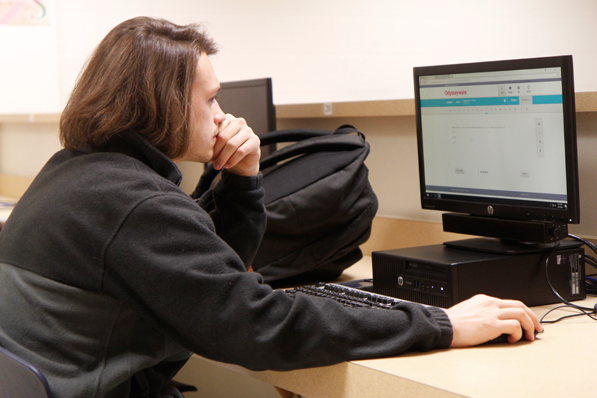
In a academic world where a number defines students looking to make the best of their lives, online classes remain the key to gain and recover credits. Breaking the eight block restrictions starts with a visit to the counselor office.
“If a student had a rough semester, credit recovery is a way for them to regain that credit and stay on track,” counselor Ms. Dana Vorsino said. “And for acceleration, students who are just wanting to get ahead in their classes can take those courses and not get behind. I think it’s a benefit.”
Students who take virtual classes during the school year have a scheduled block to work. During the summer, students can take two semesters worth of classes to get ahead in credit acceleration or catch up in credit recovery. Senior Alissa Flores takes AP Spanish 4 and currently attends the credit recovery class to advance her education.
“I think it has [benefited my education]. It has taught me a lot about time management,” Flores said. “Especially with online classes it is important to keep yourself paced and motivated. This class has taught me a lot about keeping up with my grades.”
Thirty three students take online acceleration courses this semester while 247 students recover credits through virtual classes. Because the district pays for the course during the semester, few students pay the $150 for online summer classes.
“I know a lot of students, they will take advantage of the speech and the health or they might do their foreign languages and get those done,” Vorsino said. “Sometimes the sciences and the maths tend to be a little bit harder because they have the lab component. But we have students who take advantage of classes across the board.”
Students looking to join college level sports must watch what online courses they take because not all are accepted by the National Collegiate Athletic Association (NCAA).
“Most of the time [students do well],” Vorsino said. “We kinda talk to them about the expectations of a virtual course and I check with them weekly on their progress and things like that. So most of our students do quite well in the virtual classes.”
Concern shown by students suggests a worried attitude toward receiving an appropriate grade. Currently, once an online class posts onto a transcript, it can not be removed. This prevents students from retaking classes to get a better score or to improve their grade.
“I don’t think they should just because that would give them an unfair advantage as far as GPA and class rank,” Vorsino said. “Once they have taken it and they have earned credit and it’s posted on their transcript it should remain to avoid students being able to manipulate their GPA.”
The permanent nature of the grades discouraged some students from taking the online classes. They fear the repercussions of not doing well in an unfamiliar class format.
“I wouldn’t recommend [retaking classes] because it would be kind of unfair to the kids in the normal classroom,” Flores said. “If you’ve taken the online class, you shouldn’t be given the second chance because the kids in the class aren’t given that second chance.”
All students have eight full blocks of classes. Adding online classes to that number makes it nine heavy workloads and overwhelming time commitments. Looking to get ahead in one’s studies becomes a monster of a task.
“A lot of times we have students who have full schedules and then are taking a credit for acceleration class outside,” Vorsino said, “So it definitely adds stress because it is adding another class to their workload.”




